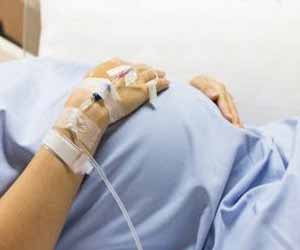- Home
- Editorial
- News
- Practice Guidelines
- Anesthesiology Guidelines
- Cancer Guidelines
- Cardiac Sciences Guidelines
- Critical Care Guidelines
- Dentistry Guidelines
- Dermatology Guidelines
- Diabetes and Endo Guidelines
- Diagnostics Guidelines
- ENT Guidelines
- Featured Practice Guidelines
- Gastroenterology Guidelines
- Geriatrics Guidelines
- Medicine Guidelines
- Nephrology Guidelines
- Neurosciences Guidelines
- Obs and Gynae Guidelines
- Ophthalmology Guidelines
- Orthopaedics Guidelines
- Paediatrics Guidelines
- Psychiatry Guidelines
- Pulmonology Guidelines
- Radiology Guidelines
- Surgery Guidelines
- Urology Guidelines
Preeclampsia linked to acute kidney injury and mortality risk

South Africa: Pregnancy-related acute kidney injury (AKI) complicates about 15% of the admissions with preeclampsia, finds a recent study published in the Hypertension journal.
Mayo Clinic defines preeclampsia as a pregnancy complication characterized by high blood pressure (BP) and signs of damage to another organ system, most often the liver and kidneys. It usually begins after 20 weeks of pregnancy in women whose blood pressure had been normal.
Preeclampsia is a common cause of acute kidney injury in low- and middle-income countries. But the incidence of AKI in preeclampsia, its risk factors, and renal outcomes are unknown. Frances I. Conti-Ramsden, Department of Women and Children’s Health, King’s College London, United Kingdom, and colleagues, aimed to examine the incidence of pregnancy-related AKI according to KDIGO AKI criteria and to identify risk factors and report renal outcomes of women with preeclampsia who developed such AKI , in this secondary analysis of CRADLE 2.
The researchers conducted a prospective observational multicenter study of women admitted with preeclampsia in South Africa was conducted. Creatinine concentrations were extracted from national laboratory databases for women with maximum creatinine of ≥90 μmol/L (≥1.02 mg/dL). Renal injury and recovery were defined by Kidney Disease Improving Global Outcomes creatinine criteria. Predefined risk factors, maternal outcomes, and neonatal outcomes were compared between AKI stages.
Key findings of the study include:
- Of 1547 women admitted with preeclampsia 237 (15.3%) met AKI criteria: 6.9% (n=107) stage 1, 4.3% (n=67) stage 2, and 4.1% (n=63) stage 3.
- There was a higher risk of maternal death (n=7; relative risk, 4.3) and stillbirth (n=80; relative risk, 2.2) in women with AKI compared with those without.
- Perinatal mortality was also increased (89 of 240; 37.1%).
- Hypertension in a previous pregnancy was the strongest predictor of AKI stage 2 or 3.
- Renal recovery rate reduced with increasing AKI stage.
- A third of surviving women (76 of 230 [33.0%]) had not recovered baseline renal function by discharge.
- Approximately half (39 of 76; 51.3%) of these women had no further creatinine testing post-discharge.
"In summary, AKI was common in women with preeclampsia and had high rates of associated maternal and perinatal mortality. Only two-thirds of women had confirmed renal recovery. History of a previous hypertensive pregnancy was an important risk factor," wrote the authors.
More Information: "Pregnancy-Related Acute Kidney Injury in Preeclampsia - Risk Factors and Renal Outcomes" published in the AHA journal Hypertension.
DOI: https://doi.org/10.1161/HYPERTENSIONAHA.119.13089
Journal Information: Hypertension

Disclaimer: This site is primarily intended for healthcare professionals. Any content/information on this website does not replace the advice of medical and/or health professionals and should not be construed as medical/diagnostic advice/endorsement or prescription. Use of this site is subject to our terms of use, privacy policy, advertisement policy. © 2020 Minerva Medical Treatment Pvt Ltd